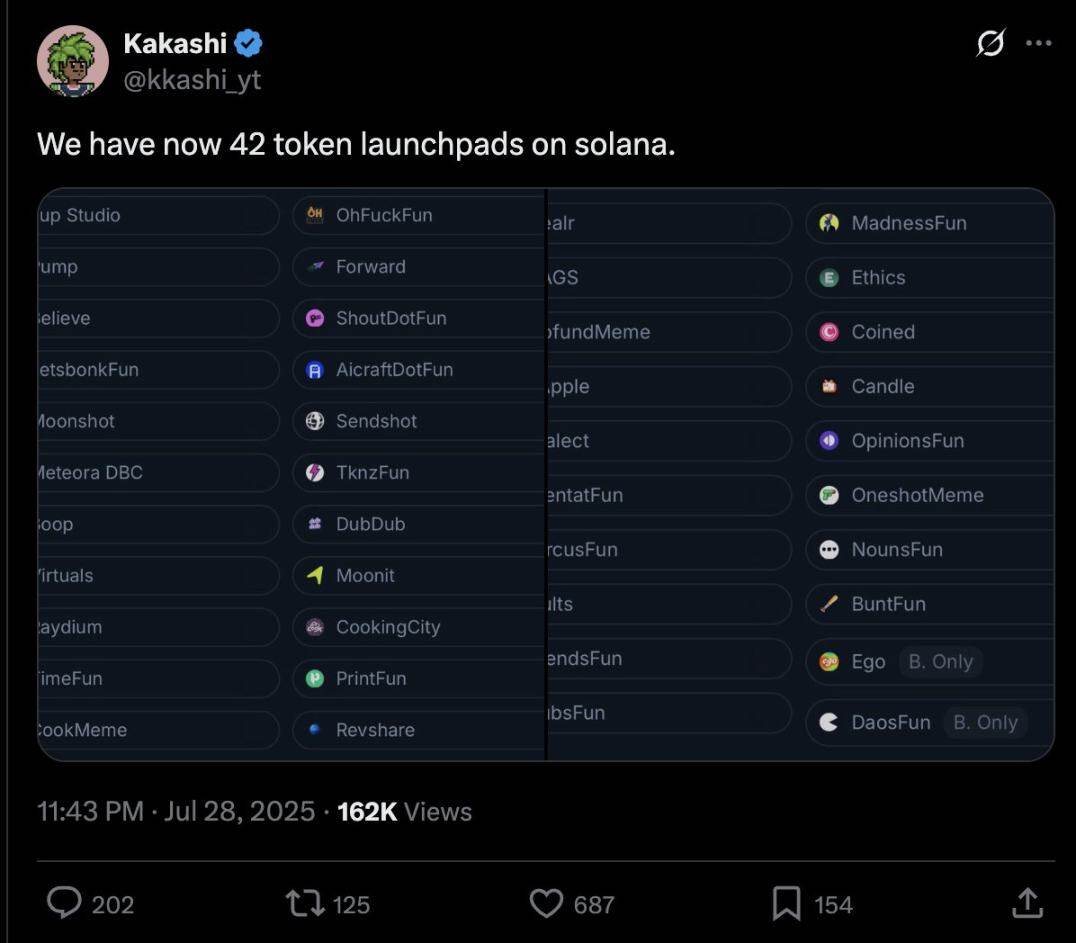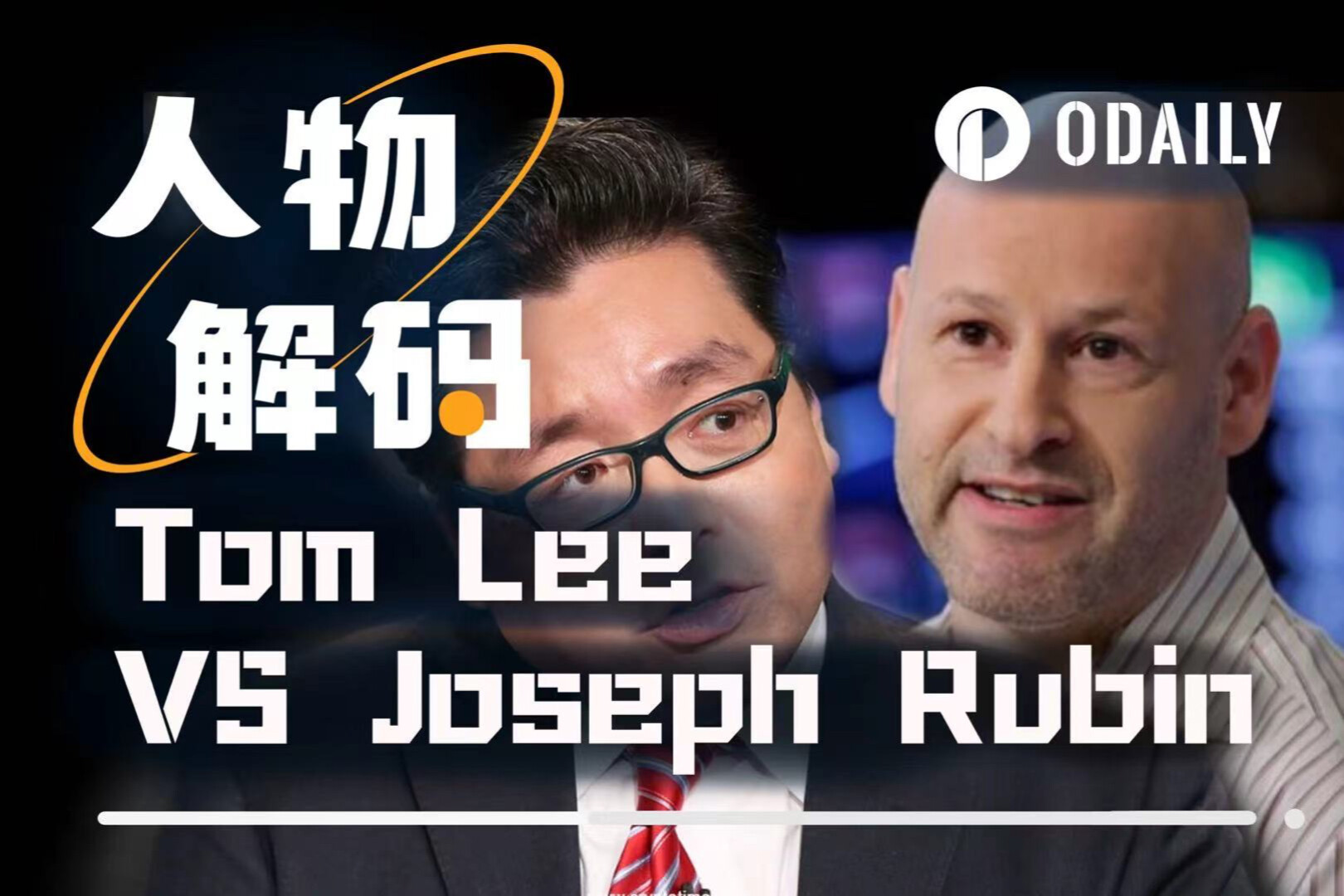Original title: "Solana Launchpad Melee: Why Can New Platforms Take Bonk's Job?"
Original author: Squid | drift
Original translation: Saoirse, Foresight News
There are already dozens of homogenous Launchpads on Solana, with more being added every day.

This article aims to provide a simple framework to help sort out the chaos in the industry and stimulate reflection. We start with the core issues:
Why would a user choose the new Launchpad over Pump.Fun (or Bonk today)?
Users can be divided into two categories: bidders and deployers. Although these two groups are highly related, since funds are a scarce resource, bidders are the core group we focus on first.
If we analyze why buyers choose new platforms over established ones, the answer is simple: they perceive greater profit opportunities. However, many of these factors are beyond the control of these platforms, so this article focuses on two drivers that platforms can control:
- Assets : Can the platform create assets with significantly differentiated value?
- Flows : Does the platform have differentiated deployer flows?
Let’s dive in.
Assets
People buy tokens for two main reasons: speculation (believing the token will appreciate in value) and utility (the token has a real use).
- Speculation level: There are many driving factors for speculation, mainly including memes (such as Meme coins) and fundamentals (such as the value brought by capital reserves, cash flow, etc.).
However, Launchpad cannot differentiate itself on a speculative level. Memes are spontaneous and market-dependent, while fundamentals like returns are ultimately determined by the project or product.
- Utility: Utility is a more flexible concept, asking, "Why would people buy tokens besides speculation?" (Of course, utility and speculation are closely related, as utility drives speculation.) Examples include token access rights, fee discounts, and governance rights.
Launchpads can gain a practical advantage by providing differentiated supporting infrastructure and tools, allowing deployers to access them from day one. This support can take many forms, but competition is likely to concentrate on platforms with a stronger focus on a specific vertical. It's important to note that supporting infrastructure must not only give the token unique utility but also create "valuable utility," giving users a compelling reason to purchase.
Social Token Case: Ego vs Time.Fun
Both attempt to tokenize social influence, and each creator can only issue one "soul-bound token" that is bound to their Twitter account.
- While Ego’s tokens are owned by creators, they lack direct utility. This “flexibility” results in creators lacking the incentive to build utility, ultimately rendering their tokens essentially indistinguishable from those on the Pump platform.
- Time.Fun is different. It builds utility into its tokens, allowing creators to quickly generate value and profit from their tokens, thereby achieving sustained user engagement.
(Note: I recognize the Ego team and chose this case because I believe they will continue to optimize.)
Furthermore, "providing utility" is not the same as "creating value." For example, many tokenized platforms based on tweets integrate tweets into supporting infrastructure, creating a "value-based curated social stream." While this is a form of utility, if no one uses this social stream, its value is zero. Such platforms often struggle to create real value.
It's worth noting that creating value is not easy, and careful assessment is required to determine whether supporting facilities or designs are truly valuable. Furthermore, differentiation is relative. Current industry trends like "token buyback tools" and "binding project economics to token flywheels" may have short-term value but will quickly become standard technology. Once differentiation is lost, they lose their appeal.
In summary, when evaluating a new platform from an “asset” perspective, one must consider: How is the token differentiated? Does this differentiation add value to the token?
The areas I’m currently focused on include: incentivized distributed training, next-generation decision markets (where there are some interesting mechanisms), niche real-world assets (where there are some novel designs), and initial coin offering mechanisms (ICMs, which are in their early stages and have great potential).
Flows
Next, let’s explore another differentiating factor: dedicated deployer traffic. This is similar to venture capital’s deal flow, and the core factor is whether the platform can attract the most popular projects to the platform.
From the perspective of limited partners (LPs), one of the key factors in evaluating a venture capital firm is whether it has a high-quality, exclusive deal flow. This logic also applies to Launchpad. Both have similar reward structures (top projects contribute the majority of deal volume/revenue), and their essence is "making value creators choose you over homogenized competitors."
For example, one opposing view is that Believe’s initial success was not due to its mechanism design (in fact, I do not agree with this design), but rather to its founder Pasternak’s ability to attract Web 2 entrepreneurs who would not have originally issued tokens – this is the value of traffic.
Large platforms inherently have traffic advantages: they possess users, ecosystem integration capabilities, and distribution channels. However, user attention is a scarce resource, and new platforms must rely on tangible differentiation to attract traffic.
Here are a few common factors that contribute to traffic differentiation:
- Founder influence : The crypto industry is small, so connections are crucial. Do the platform founders have sufficient social connections to attract deployers? Can they build social support for the token after the project launches? (For example, Pasternak)
- Momentum : Does the platform have a history of successful launches? For example, Bonk's Launchpad, thanks to its successful token issuance, has encouraged more people to issue and bid on tokens, creating a "social flywheel effect." Early-stage platforms should screen high-quality projects for in-depth support. A few failed launches can destroy a platform; after all, the flywheel effect is a two-way street.
- Specialized positioning : If a platform focuses on a niche area, having a specialized community can increase project visibility. Examples include AI agents and virtual assets (despite the homogeneity of tokens themselves). This advantage is particularly evident when the platform targets non-crypto native users.
- Capital formation capacity : For commercial projects, the ability to raise funds in the initial stages of launch can impact their ultimate success or failure. Does the platform's issuance mechanism and coverage facilitate higher levels of capital formation?
- Practicality : As mentioned above, the practicality of an asset can directly attract traffic.
In summary, when evaluating a new platform from a traffic perspective, consider the following questions: Why did deployers choose this platform? What were their current reasons for choosing it? Is this differentiation sticky and scalable?
Market View
Here is my analysis of the trends of the major launchpads in the market (not the chains marked on Solana) :
- BonkFun : An industry leader with a significant meme advantage. Its dominance is more secure than expected and will be difficult to shake unless a completely new incentive mechanism platform emerges.
- Raydium, Jup, and Orca (coming soon): These platforms offer similar assets and standardized technology, but they maintain traffic through brand and funding advantages. Competition focuses on business development, attracting more platform partners, and providing better support for popular tokens.
- Pump.fun : Lacks differentiation and is losing traffic until it rolls out more streaming features. Unless it launches incentives or new products, it's unlikely to return to its peak in the short term. Aggressive acquisitions or capital operations could be a factor.
- Block: Due to the cooperation with WLFI, we are differentiated at the asset level.
- Zora : (deployed on the Base chain) Relying on the traffic of the Base ecosystem to become a leading platform, but due to asset homogeneity, its market share may decline as more platforms enter the market (but the support of the Base camp may be able to reverse this trend).
- Doppler : As the "Launchpad of Launchpads", it has high industry recognition and good development prospects.
- MetaDAO : Differentiated asset creation, but needs to prove the value of the governance mechanism.
- Vertigo : Undifferentiated assets (counter-sniper technology is standardized), but still has opportunities to attract deployers.
- Believe : (Deployed on BNB Smart Chain) Its core advantage lies in traffic, but currently, there is a loss of deployers and market sentiment is unclear. I still have high hopes for the project, but I need to evaluate its health through new projects launched online.
- heaven : (deployed on BNB Smart Chain) The design is excellent. The core issue is how to attract high-quality deployers, and its investors may be able to provide assistance.
- The Metagame (deployed on BNB Smart Chain) , Trends : Details are unknown, but the team is a veteran crypto native player (this is crucial) and is expected to break through in the social field.
Summarize
- Verticalization is an important opportunity, but real value must be created.
- Early investment is more likely to pay off than betting on "defensive" or market growth.
- Novelty should be valued.
- 核心观点:新Launchpad需差异化资产与流量突围。
- 关键要素:
- 资产差异化需创造实用价值。
- 流量依赖创始人资源与成功案例。
- 垂直领域专业化是竞争关键。
- 市场影响:加速Launchpad细分与创新竞争。
- 时效性标注:中期影响。



